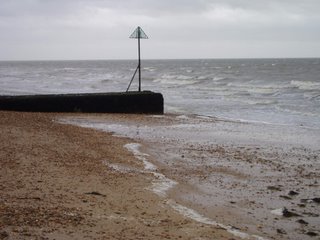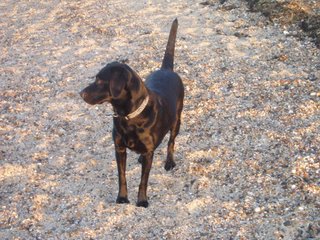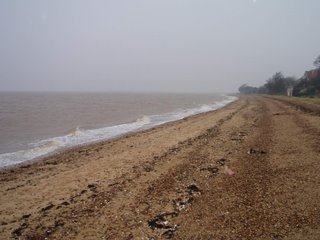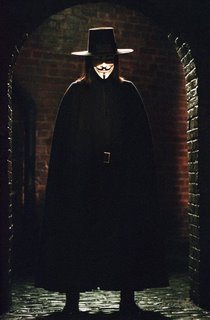One Salient Oversight is (hypothetically) questioning President Bush about whether he is an evangelical. I thought I’d answer the questions for myself:
1. Mr President, if you died tonight and stood before God, and he asked you “Why should I let you into heaven”, what would you say to him? An evangelical would focus solely upon the death of Christ and his atonement on the cross for sin. If the president attempts to use his own works or deeds as the basis for entering heaven, then his faith is not in Christ to save, and he is not an evangelical.
Sam would say “You shouldn’t, but I didn’t think ‘should’ was the important thing. Isn’t that Law not Grace?” Beneath the different vocabulary I suspect I’m pretty evo on this one.
2. Mr President, can you please give an example of how God has guided you during your time as president? This is a general question that would reveal how the president thinks God guides. The key is whether or not he mentions the Bible, since the Bible is considered at least a major way that God guides amongst evangelicals.
Sam would say: probably best example is getting the 9:30 service going. Lots of time thinking and praying through that, and it seems to have prospered. Didn’t look at the Bible specifically though.
3. Mr President, do you think that sincere, devout and peaceful Muslims go to heaven when they die? This is a “gotcha” question that will force the president to either deny his faith or to sound arrogant. All evangelicals believe that the Christian faith is an exclusivist faith, which would mean that even devout Muslims are unable to reach heaven. If he thinks that devout Muslims go to heaven, he’s not an evangelical.
Sam would say – it’s not those who call on the name of the Lord who are saved, but those who do the will of his Father in Heaven. It is not for us to restrict the actions of God’s grace. All will be judged by a merciful God, and that is His business.
4. Mr President, do you think that God could forgive someone as evil as Osama Bin Laden? How? This is a question that will further outline the president’s understanding of how God forgives. For the evangelical, no sin is too big for God to not forgive, so long as the sinner puts his faith in Christ. The “how” question would expand this answer. If Bush says he does not know, or focuses on anything apart from Christ, his answer is not one an evangelical would give.
Sam would say: God forgives all those who truly repent.
5. Mr President, which is your favourite book of the Bible? If he reads the bible (as he says he does) then this should be answered easily, along with some explanation of why that book is his favourite. Vague answers or “it’s all good” are not acceptable for an evangelical, who sees the Bible as being very important in his/her life. If Mr Bush can’t give a good answer, the chances are that he doesn’t read the Bible.
Sam would say: I prefer the New Testament to the Old, I prefer the Gospels to the Epistles, I prefer John to the Synoptics, and my favourite bits of John are the prologue, the second half of chapter 6 and the farewell discourse.
6. Mr President, when Jesus was on earth, do you think that he may have occasionally sinned? This is a question that would show up Bush’s understanding of Jesus. If he believes that Jesus is God and is perfect, his answer would be a simple “no – Jesus did not sin”. If he gives an “I don’t know” or a “yes” in response then he has a deficient understanding of who Jesus is and is therefore not an evangelical.
Sam would say: before his baptism, I have no qualms about thinking that Jesus may have “sinned” in terms of doing something seen as wrong by his community (eg his mother) – that would simply be a part of normal human development and maturation. After his baptism he was sinless; furthermore he was ‘made perfect by his suffering’.
7. Mr President, many sincere Christians think that Jesus didn’t actually rise from the grave, what would you say to them? Similar to the last question, this is another “gotcha” that gives him little room to move. Evangelicals believe that Jesus physically rose from the dead and Christians who deny this are in grave error, no matter how sincere they are. If Bush is brave and says this, then chances are that he is an evangelical. If he talks about their sincerity of faith as being more improtant that the fact of the resurrection, then he aint an evangelical.
Sam would say: the resurrection is the horizon of Christian belief. Those who deny it have not entered fully into the truth of the Christian faith.
Probably means I don’t qualify as an evangelical, but I’m closer than I would once have believed possible 
BTW have a look at the picture here. Wonderful stuff, which really speaks to me. Thomas doubts – yet he is also the one who gives voice to the climax of John’s gospel: “My Lord and my God!” Doubt is not the enemy of faith, it is the siamese twin of faith. The opposite of faith is fear, not doubt.







